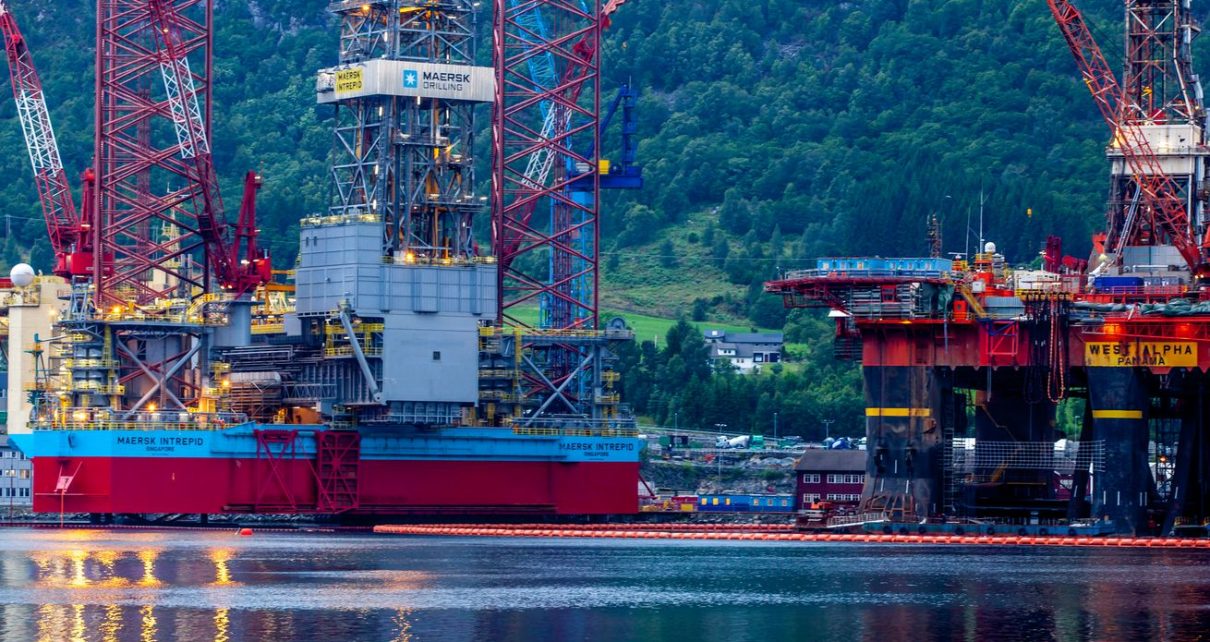
An expert explains Norway’s climate change paradox.
Norway’s ambition to be an international leader on climate change is at odds with its status as one of the world’s largest oil and gas exporters.
In 2019, the country was 15th on the list of the world’s top oil-producing countries, according to provisional data from the International Energy Agency, and ranked eighth in the world for natural gas production, behind Australia but ahead of Saudi Arabia.
The bulk of revenue from Norway’s oil and gas production is kept in a sovereign wealth fund, which was created to keep the money for the Norwegian people and future generations. The fund, which has amassed $1 trillion since its inception in the 1990s, is a source of stability for the nation in times of economic instability, like the coronavirus pandemic.
In December, Norway’s Supreme Court ruled against environmental activists who sued the government because they felt oil-licensing permits granted in the Arctic threatened their right to a clean environment under the country’s constitution. The decision will now pave the way for more drilling in the Arctic.
Experts refer to this as Norway’s “paradox”: Norway wants to be at the forefront of international efforts to address climate change, yet it continues to rely on heavily polluting fossil fuel extraction for continued economic prosperity.
To get a better sense of this paradox and how Norway might be able to finally break out of it, I spoke with Bard Lahn, a researcher at Norway’s Center for International Climate Research (CICERO) in Oslo. Lahn is an expert on the country’s oil policy and how Norway is trying to align its ambitions on climate change with its role as a large oil and gas producer.
Our conversation, edited for clarity and length, is below.
Jariel Arvin
Let’s start at the beginning: When was oil discovered in Norway, and what was the economy like at the time?
Bard Lahn
The first major oil discovery was made the day before Christmas Eve in 1969. From the early 1970s, Norway started to develop its oil and gas production. At the time, the Norwegian economy was pretty much in the same place as its other Nordic neighbors and much of Western Europe. I think that’s an important point: Norway really wasn’t a poor society prior to discovering oil.
Jariel Arvin
But the discovery of oil did end up making the country far wealthier, right? How did that happen?
Bard Lahn
If you go back and read the policy documents at the time oil was discovered, it’s surprising how mindful politicians were to make sure that the money from oil went to society as a whole.
There was a lot of fear that countries with large oil industries — like the United States — would sweep in and take all the earnings out of the country, so there were lots of policies put in place to ensure the benefits of oil production would stay in Norway.
Jariel Arvin
And what about the sovereign wealth fund?
Bard Lahn
Since the mid-1990s, the sovereign wealth fund has captured all of the revenue that comes to the state from oil and gas production. It’s currently the largest sovereign wealth fund in the world, worth over a trillion dollars. Divide that by a population of roughly 5 million, and you can see that each generation has considerable wealth through the fund.
The whole idea of the fund is that it’s not going to be spent. It’s a way of saving the revenue for the future so that what’s being spent is always just the returns.
Jariel Arvin
How does the wealth fund impact everyday Norwegian society?
Bard Lahn
The money constantly being transferred into the economy has given Norwegian politicians a lot of room to increase spending without having to make some tough budgeting decisions that are a reality in other countries. There’s certainly an awareness that Norway has savings and a lot of money to give us comfort during troubling times.
Take the pandemic, for example. We always know that we have this money available that can be used to soften the blow.
Jariel Arvin
Okay, so clearly the oil-driven wealth fund is vitally important to Norway, both economically and politically. But at the same time, the country wants to be a preeminent player in solving climate change. How can Norway continue to rely so heavily on oil and gas extraction and claim to be an environmentally progressive nation?
Bard Lahn
Ever since climate change has gained importance, there has been broad political agreement in Norway that the country should address the problem. But at the same time, we are still one of the largest fossil-fuel exporters in the world — we’re exacerbating the problem we want to solve.
In Norwegian politics, there’s been a very successful attempt to separate the discussion of oil policy from the discussion of climate policy. The two were never really tightly linked [in the country] until roughly the last decade, and this division has become increasingly difficult to maintain.
Jariel Arvin
Would you say that Norway has been intentionally dishonest by separating its oil policy from its climate policy?
Bard Lahn
I wouldn’t say “dishonest,” because the people who helped design this way of separating climate policy and oil policy were actually convinced that they were doing the right thing.
Norwegian politicians also haven’t been alone in creating the conditions that made this division possible. They’ve been helped immensely by the international climate regime. Take the Kyoto Protocol, for example, which very clearly places the responsibility for greenhouse gases on the country where fossil fuels are consumed, and not the country where they are produced.
From the very beginning of international climate policy, there was this agreement that countries had to account for the emissions that they create when they burn fossil fuels. All the responsibility was placed on the demand side, not the supply side, which was very convenient for Norway.
Jariel Arvin
Where does Norway’s oil go? Have there been any significant studies on the environmental impact of its oil production abroad?
Bard Lahn
Europe is the primary market for Norway’s oil and gas. But determining the climate effects of Norwegian production is not straightforward. One study has estimated a clear climate benefit from reducing oil output, but the market is complex and the result really depends on your assumptions about how other actors will behave and how the market will evolve over time.
Jariel Arvin
What’s the consumption of energy like in Norway compared to other countries?
Bard Lahn
The big irony here is that Norway is a fairly large fossil-fuel producer, but we use relatively few fossil fuels directly in our energy use. Nearly all of our electricity has for a long time come from hydropower. In most years, we even export quite a lot of renewable electricity to our neighbors.
The only place where fossil fuels are used to directly produce energy is to run the platforms offshore. They use gas to run the turbines to get the energy needed for oil and gas production.
Jariel Arvin
I saw a recent report that Norway’s government is raising carbon taxes on its oil sector. Is that a way for the government to force the industry to make up for its pollution?
Bard Lahn
The government’s new climate plan, which was unveiled just a few days ago, does include a number of new and more aggressive measures to reduce Norway’s domestic emissions. The proposal to increase the already quite high CO2 tax on offshore emissions came as something of a surprise, and it is likely to pass even if it is currently being challenged by the industry.
However, it is important to keep in mind that this proposal only targets the production-related emissions of Norwegian oil, not the level of oil that is being extracted and exported. As such, it is in line with the historical separation between climate and oil policymaking, which tends to focus only on emissions happening within Norway and exclude any concern for the climate impact of exported oil and gas.
Jariel Arvin
So, bottom line: Can Norway actually be a climate-change leader while this paradox still exists?
Bard Lahn
The Norwegian paradox has worked out fairly well up until the last few years because there has been little focus on the production of fossil fuels, and because Norway is small enough to avoid the scrutiny that some larger nations face. But this is quickly changing, both in the domestic and international political discussion.
There is now a lot more focus on the supply side of fossil fuels than 10 years ago, with several countries like Denmark announcing an end to drilling and new research showing a mismatch between planned fossil-fuel production and ideas such as a “non-proliferation treaty” for fossil fuels being floated. The treaty would bring the world together in agreeing to end the use of fossil fuels much like the UN came together to curb the spread of nuclear weapons.
This will make it increasingly hard for Norway to hold on to a leadership claim as long as oil production keeps being expanded into new areas.
Jariel Arvin
What’s most likely to get Norway to end its oil and gas production? Economic concerns? International climate concerns? Political pressure?
Bard Lahn
Economic concerns are likely to be decisive, which is why much of the national political debate about the future of oil is precisely about the economic side: How risky will it be to bet on new oil extraction in potentially high-cost areas such as the Arctic if climate policy reduces demand and keeps prices low?
But political pressure and a concern with Norway’s international reputation could play a role, too, especially in determining how far politicians are likely to go to keep oil activity artificially high. The high number of jobs in the sector gives the industry a lot of political leverage — which we saw recently during the pandemic-fueled price drop last year.
The oil companies won a huge victory in Parliament, with very favorable tax conditions in order to avoid job losses and reduced investment. This type of political power play might very well become more frequent if the industry continues to decline, and in that situation, international pressure and climate concerns could play a role in counteracting industry lobby power.
Jariel Arvin
Do you think the country will ever face up to its history and the reality of what its oil and gas production has already done to the environment?
Bard Lahn
I am sure this will be a hotly contested part of Norway’s oil history for decades to come. There is a very strong established narrative of Norwegian “exceptionalism” in the oil sector — that because of our strong social-democratic system we were able to control the oil industry, avoiding the “resource curse” [the paradox of resource-rich countries often doing less well economically than countries with few natural resources] and ensuring that the country’s oil wealth benefited all of society.
There is much truth in this. But the environmental side of the story is increasingly challenging the established historical narrative and even our national identity, and we already see that this is a source of tension in the national debate about oil and climate policy.





